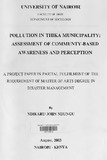| dc.description.abstract | The main objective of this paper was to investigate on issues related to community
involvement in pollution management in Thika Municipality. The study objectives were
the following.
• To establish and reliably quantity the pollution awareness levels III Thika
Municipality
• To find out the perception and attitudes towards pollution problems in Thika
Municipality
• To identify and appraise community mechanisms for pollution prevention.
• To suggesting guidelines for community pollution prevention strategies.
To achieve the objectives of this study, both quantitative and qualitative research
methodologies were used. The qualitative phase consisted of face-to-face interviews
administered questionnaire.
In addition rating questions were used to quantify public opinion. The qualitative phases
consisted several focus group discussions and in-depth interviews to selected members of
the community in questions. In essence, the qualitative phase was used to provide more
insights and findings obtained from the quantitative phase.
Among the major findings, air, water and solid wasted pollution were adversely
mentioned as the problem the community. On the other hand, noise pollution was not
considered to be harmful in any way to the community. This was due to the limited
knowledge of the community
The major effects of polluting enumerated included the destruction of buildings and other
structures. And the increase in audience in Human URTIs and other related infections. In
terms of institution capacity to handle pollutions, a gap was identified as it regards
expected and seize delivery to key players; the local authorities. To fill this gap,
community based organizations with objectives on environmental management were seen
to offer implementing services.
Among the major recommendations, was that all the key stakeholders i.e. the
industrialist, community, and the government should put measures in place to ambit any
situations that will otherwise lead to pollution disaster scenarios. In addition to that, the
government needs to initiate and implement realistic policy guidelines that would control
pollution problems nationwide. There lacks a comprehensive policy framework in
relation to pollution and especially in the urban areas. | en |

